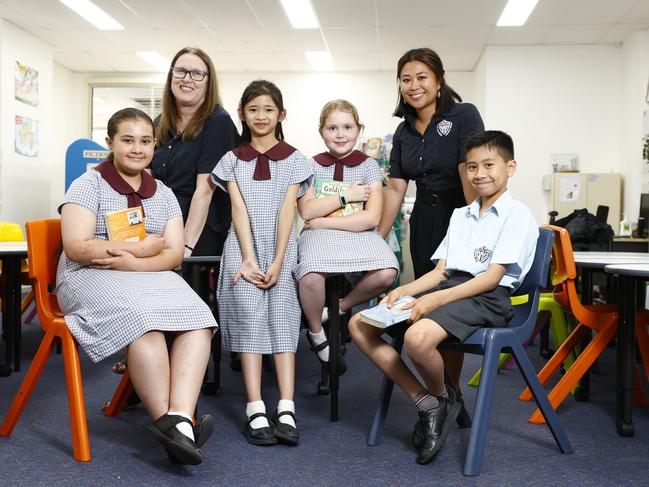Analysis: Majority of NAPLAN’s most improved schools public and rural
Sherwood Hills Christian School is one of only a handful of the state’s private schools to rank among the most improved. Here are the lessons to be learnt from our class acts.

Education
Don't miss out on the headlines from Education. Followed categories will be added to My News.
Fifty kilometres from Sydney’s CBD, Sherwood Hills Christian School in Campbelltown is celebrating a marked improvement in its primary school students’ NAPLAN results which are up 15.85 per cent, making it one of only four non-government schools in the top 20 most improved since 2017.
The school employs literary, numeracy and science specialist teachers for primary students, which head of primary Sue Thomas says is key to her pupils’ success.
Ms Thomas teaches literacy to students in Years 3 through 6, and has been with her current cohort for all four years.
“We don’t teach for the NAPLAN plan as such, but we do have specific reading lessons to focus on strategies,” she said.
“You get to know the kids really well — I know what they need to learn, and how they learn. They become very comfortable, which makes learning easier.”

Reading and writing are important within the school community, she said, with parents and students turning out in droves for the recent book fair.
“Parents are really supportive with reading … it’s our most popular event,” she said.
Ms Thomas said a significant explanation for her school’s dramatic improvement in the NAPLAN results was taking the tests online for the first time – students were suddenly volunteering to take the tests where teachers once had to coax them into the exam room.
Special features such as the online ruler in the numeracy exam were readily utilised by her pupils, who use technology a lot in the classroom.
“Some of them would complain and say ‘do I have to do this?’, but now they’re excited,” she said.
“It was quite dry, taking a paper test, whereas now it’s quite tactile. (In maths) when learning is play-based and puzzle based, they get to see it in a different way.”
Year 5 student Seira Egan said she enjoyed the first online NAPLAN exam. “I liked it because it was a bit easier,” she said.
“I did some Mathletics tasks and practised some reading comprehension.”
Year 3 student Katelyn Kruse said she liked using the computer while her classmate Elise van Dijk also enjoyed doing the test. “We wrote some stories too,” she said.
Year 5 student Eleazar De Leon much preferred taking the test online. “It was very challenging, but I liked it overall, because it was like a game,” he said.
“We took maths classes too to prepare for it.”
ANALYSIS: LESSONS TO LEARN FROM OUR CLASS ACTS
Glenn Fahey
While bad news is all too common in education, there are also some success stories worth celebrating.

Some schools – mostly in disadvantaged areas – are recording excellent outcomes and have made significant improvements. The results are life-changing for students.
Students who do well in NAPLAN are much more likely to finish Year 12, achieve an ATAR that gets them a place at university and successfully find work as young adults.
That’s why it’s so important that the schools achieving good results are highlighted and more is learnt about what brought them success.
The evidence shows the key is not more funding, smaller classes, new curriculum, or extra tutoring. Instead, it’s a surprisingly simple recipe – high-quality teaching and leadership.
A common finding is that teaching in those schools is explicit – meaning teachers consistently give clear explanations and sufficient guidance when learning new content.
Effective leadership helps ensure school is orderly, with clear expectations. Experienced and capable principals lead teams of teachers, rather than consume their days on paperwork, red tape and bureaucracy.
The successes of education must be highlighted – and lessons learnt from them.
Glenn Fahey is program director in education policy at the Centre for Independent Studies.





